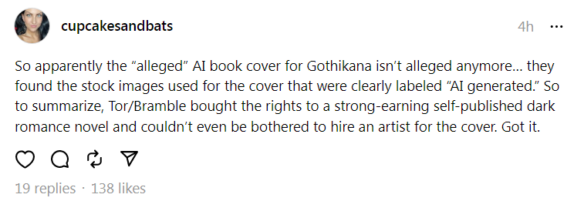(1) LEAVING THE HAMC. Cheryl Morgan’s 7-point “Public Statement re the Hugos” at Cheryl’s Mewsings explains why she recently resigned from WSFS’ Hugo Awards Marketing Committee. It says in part:
3. As a member of the Hugo Awards Marketing Committee it was my duty to ensure that the results of the Hugo Award voting process were posted to the official website promptly and accurately, as they were supplied to us by each year’s Worldcon, including those from Chengdu. We had no authority to comment on or change those results in any way.
4. I am not, nor ever have been, a member of the WSFS Mark Protection Committee (MPC).
5. I am not, nor ever have been, a Director of Worldcon Intellectual Property (WIP), and have no financial stake in that organisation. WIP was created from the corporation that ran the SF&F Translation Awards (of which I was a Director), but no directorships carried over from the one organisation to the other, save for Kevin Standlee who is a Director of WIP because of his membership of the MPC.
6. I resigned from the Hugo Award Marketing Committee, primarily because I no longer wish to be held responsible for (including being subject to legal and reputational risk for) the actions of organisations of which I am not a member and over which I have no influence….
(2) DAVE MCCARTY SEXUAL HARASSMENT ALLEGATIONS. McCarty’s name is in the news because of the Hugos, but two people today shared other grievances at Bluesky.
Jesi Lipp added, “I’ve never made it a secret that he groped me at a Smofcon in 2011 and it has always been largely treated as a non-issue.”
(3) AI COVER TRACED TO SOURCE. Cassandra L. Thompson draws attention back to the Gothikana AI book cover story on Threads

Thompson’s comment appears to be in response to a TikTok video by emmaskies.
(4) DRAWN THAT WAY. Novelist Kelly Link tells the Guardian “‘I was drawn to the monsters and half-naked women on fantasy covers’”. Here’s an excerpt from the interview.
The book that changed me as a teenager
I was a weekend lurker in the fantasy and science fiction section of my local bookstore, eager to spend my weekly allowance, but overwhelmed by the selection. I was drawn to the monsters and half-naked women on the paperback covers of Arthur Saha’s Year’s Best Fantasy anthologies, but too embarrassed for a long time to bring one up to the counter and pay for it. When, eventually, I got up the nerve, I found the stories uniformly enthralling, and the bookseller didn’t bat an eye. After that, I grew much more bold about what I wanted to read, regardless of how lurid the cover might be.

(5) NEW TOU ARE DOA. Writer Beware’s Victoria Strauss reports “Outrage Over New Terms of Use at Findaway Voices Forces Change”. Pushback against Findaway/Spotify’s new Terms of Use succeeded in bringing about a substantial revision.
…Unsurprisingly, the new license terms generated a storm of criticism. Judging by what I saw on social media, and by what authors who alerted me to the new TOU told me, many rights holders took steps to cancel their contracts. Findaway/Spotify appears to have been caught completely flat-footed by the backlash.
… There’s still some vagueness (“otherwise use”) and I note the inclusion of “training” (AI training? It’s not clear, although I think the language following suggests not).
But it is a substantial change, and it does address the criticism of the original version. The license is no longer irrevocable or royalty-free. “Translate” and “modify” have been removed, as has the derivative works language. There’s no longer a moral rights waiver. And, pretty clearly in response to authors’ and narrators’ concerns, the final sentence rules out using audiobook files to create new works based on the original, or to create new machine voices, unless the rights holder gives permission (although, if I were a narrator, I might wonder whether “new” in that context creates a loophole for duplicating an existing voice).
There are two ways to look at what happened here. One is that Spotify tried an egregious rights grab, got called out for it, and did what greedy corporations sometimes do when challenged: walked it back, though not quite completely. The other is that Spotify did not anticipate the backlash, and whether because it recognized the validity of the criticism or simply saw that its self-interest was at stake, reconsidered and implemented the change.
Regardless, I do think that Findaway/Spotify deserves some credit….
(6) KERFUFFLE OVERDOSE. Maya St. Clair delivers “The last News from the Orb”.
This week, I took down that psychoanalytic take I did about Cait Corrain. Reception of the piece was positive, but I’d started to feel rankled and uncomfortable when I saw it on my page, like I needed a shower….
St. Clair’s explanation deserves a click-through to read. And I truly empathize with the next paragraph.
…As the Internet plunges its talons further into everybody’s brains, this kind of doom spiral is going to get harder to resist. The SFF, publishing, and book-reading communities have largely chosen their futures, and it’s more of this codependency: more controversies, more incidents called Something-Gate, more of that awful, druglike disgust that keeps one fixated. As writers, we could follow along: delve into endless Internet research, throw around receipts, assemble our alembics and phials and glass curlicues and try to distil the final Take on this week’s Cait Corrain. Or maybe we could think about literally anything else….
(7) THOSE WERE THE DAYS, MY FRIEND. Peter Wood discusses “The Pros and Cons of Nostalgia” at Asimov’s SF blog From Earth to the Stars.
Margaret Atwood and I both grew up in large Canadian cities and our fathers ran summer camps in rural Ontario. Atwood’s father, a forest entomologist, took his family from Toronto into the wilds of Ontario to live with graduate students. As a teenager, Atwood worked as a camp counselor for three years.
I tell you this, because our family lived at the northern Ontario summer camp my Dad ran for the Ottawa Boys Club every summer until we moved to Florida. I worked for three years as a camp counselor in college. No need to cue the Twilight Zone music, but the settings of two of Atwood’s short story collections—Moral Disorder and Cats Eye—spoke to me because of her descriptions of rustic Ontario in the summer and cold dark winters in Toronto.
Like Atwood, I often use my own memories to embellish my writing. “Une Time Machine, S’il Vous Plait” has scenes in a summer camp in northern Ontario and sections in the dead of winter in Toronto and Ottawa in the 1970s. Those scenes were some of the easiest in the short story to put to paper, because they are still vivid to me. Their impressions are much stronger than memories of much more recent events….
(8) DAVE MCKEAN Q&A. The Comics Journal’s Jake Zawlacki has a long, probing interview with Dave McKean. One question is about Midjourney. “’I Will Always Choose Reality’: Dave McKean, Retrospective”.
…It seems that AI may be soon having its day. Early in the book you tease a reason for Thalamus finally coming about and mention an “emergency final page.” When we get to the end, you offer a very honest experience with using Midjourney, and how you felt you needed to accommodate AI in your work, or quit. To start, how do you feel about someone typing in “Dave McKean style comic book cover” into Midjourney and using the result?
I had completed the book by June of last year, and had written that last page as a much more positive paragraph with walking anecdotes and bird pictures and a sense that I’d never felt more professionally fulfilled and personally happy as I did at the time, partly because I really enjoyed putting the book together and revisiting so much stuff that I determinedly had not looked back at for decades. But then the Midjourney thing happened and suddenly the book took on a whole other meaning for me, it was literally the end of my era, from now on my life is pre and post AI.
To start? I consider that action to be theft, the final image will be trained on my work without my knowledge, agreement, or any reimbursement. It’s fraudulent, because the user will consider it their work when my name is in the prompt, surely no simpler paper trail has ever existed for a fraud court case? So then it also makes a difference to me whether this is just one person at home having some fun with a new tech toy and not taking it any further, or someone selling that image, and there’s a greyscale of uses in between. The legal side is a minefield, and we really haven’t caught up with the implications. And finally, and most importantly in this case, the people I’ve talked to who are enthusiastic about AI actually believe this is a creative act. Typing a few words into a bot, and they will tell you how much they thought about the exact words to use, and tweaked the prompt 20-odd times, but this is essentially typing a few words into a bot and waiting a minute. This is such a denuded idea of what creativity is, they are only fooling themselves. There will always be artists who will use it as a tool and be very clear and thorough about staying on the right side of perceived moral lines, but I think they are hypnotized by the shiny new thing. They will be the Trojan horse that wrecks the notion of art, something which has carefully evolved over tens of thousands of years and helped shape the best of us, trashed by glorified predictive text. And you have no idea how sad it is for me to hear artists justify this work with the sort of evasive, relativist art-bollocks that has corrupted the contemporary gallery market….
(9) BISHOP REMEMBERED. Asimov’s editor Sheila Williams tells about her friendship with the late Michael Bishop and his family in “Cri de Coeur”.
…The 1992 World Fantasy Convention was held in Mike’s hometown—Pine Mountain, Georgia—and that’s where I got the chance to really get to know him. After spending time with Mike and his wife Jeri, they invited me, and a couple of other people, over to their beautiful home. They gave us a tour of their house, which I believe had been owned by Jeri’s family for a few generations. They also regaled us with stories about their son Jamie and daughter Stephanie, who were both away at college.
My oldest daughter was born in 1993, and I tentatively included a photo of her in a few of our authors’ holiday cards. Mike’s response to the photo and his sincere interest in my family encouraged me to continue to include these photos in cards and to expand on the number of people who received them. [I know some authors were perplexed, but I was delighted that eventually many started sending photos of their kids and/or pets back to me.] As I told Mike years later, I also tried to emulate the loving home life for my kids that he and Jeri had provided for their own children.
Mike’s ninth story in Asimov’s, “Cri de Coeur,” was our September 1994 cover story. This moving novella about the journey on a generation starship was also a finalist for both the Hugo and the Theodore Sturgeon Award. There was a twelve-year gap between Mike’s tenth Asimov’s story in 1996 and his eleventh in 2008. During that time, Mike and I mostly stayed in touch via holiday cards.
On April 16, 2007, Mike and Jeri experienced one of the most terrible tragedies that can befall a family. Their thirty-five-year-old son Jamie, now an instructor of German at Virginia Tech, was murdered in the deadliest school shooting in U.S. history. Mike’s next tale for us, “Vinegar Peace, or, The Wrong-Way Used-Adult Orphanage” (July 2008), was the painful story of a society that sends adults to orphanages after their last child dies. It, too, was nominated for a Nebula….
(10) TODAY’S BIRTHDAY.
[Written by Cat Eldridge.]
Born February 19, 1937 — Terry Carr. (Died 1987.) I’ll admit right now that I do not know Terry Car from any of his novels which are Warlord of Kor, Invasion from 2500 co-written with Ted White, and Cirque. I’ll certainly invite opinions on how they are. What I do know about him is from his most excellent and rather extensive work in the area of editing anthologies.
But first I must discuss his work as a fanzine editor, winning his first Hugo for the zine FANAC, co-edited with Ron Ellik, which they started in 1958. There were seventy-one issues (the last six were co-edited with his first wife, Miriam Carr). Read the first issue at Fanac.org. Terry would win a second Hugo for Best Fan Writer in 1973 at Torcon II. He would also be the 1986 Worldcon’s Fan Guest of Honor.

His work on anthologies began in the Sixties on the first seven volumes of World’s Best Science Fiction with Donald A. Wollheim. I’m reasonably sure that I’ve read at least some of them as the contents are quite familiar.
Also while working for Donald A. Wollheim at Ace Books, he was responsible for the acclaimed Ace Special series, bringing out R.A. Lafferty’s Past Master (1968), Ursula K Le Guin’s The Left Hand of Darkness (1969) and Alexei Panshin’s Rite of Passage (1968).
Now I know that I’ve read much of his next two anthology series as they were quite excellent. They came out almost out at the same time as the Seventies got under way, with Universe having an impressive run of seventeen volumes, and The Best Science Fiction of the Year with just a volume less.
He also had an anthology series devoted to original fantasy only, New Worlds of Fantasy which published three volumes stating in the Sixties. He did five volumes in the Fantasy Annual reprint series starting in the late Seventies.
His work would earn two Best Professional Editor Hugos (1985, 1987).
Lastly, he published in his regrettably brief lifetime a reasonably large amount of shorter fiction, over forty pieces. The Seventies collection The Light at the End of the Universe is the only sole look at his short fiction to date. Subterranean Press, where art thou?
(11) COMICS SECTION.
- Thatababy apparently learns from Looney Tunes.
(12) WEB BREAKS. The Hollywood Reporter says it’s dead, Jim: “Inside Sony’s ‘Madame Web’ Collapse: Forget About a New Franchise”.
The trailer buzz was worrisome, advance ticket sales anemic. Then last week, the critic reviews for Madame Web were posted, and they stung deepest of all — Sony’s Spider-Man spinoff received the lowest average Rotten Tomatoes score (13 percent) of any major superhero film in nearly a decade.
“On Wednesday night, you could actually watch advance purchase sales declining in real time as buyers were refunding their tickets,” marvels a major theatrical chain insider. “It really says something when you’d rather have Shazam! 2 numbers.”
It marked one of the lowest starts in Hollywood history for a film based on a Marvel character. Domestic box office for the first six days in North America was just $26.2 million after opening midweek on Valentine’s Day. International tallied $25.7 million from 61 markets. Even the fan-friendly CinemaScore grade was poor (C+ — extremely low for a superhero title).
Like DC and the once-unstoppable Marvel, Sony is now finding itself in under the gun to reevaluate how it makes comic book movies….
(13) LEFT BEHIND. “Harrison Ford left behind a Star Wars script. It just sold for $13,600” reports Yahoo!
A draft script from the original Star Wars movie trilogy, left in a London home rented by the actor Harrison Ford in the 1970s, has sold for more than $10,000 at auction.
The fourth draft of the screenplay that became the epic 1977 film “Star Wars: Episode IV – A New Hope” was unbound and incomplete. But it included iconic scenes, including the one that introduces Chewbacca – the towering, hairy Wookiee who co-pilots the Millennium Falcon alongside Ford’s character, Han Solo – in a dimly lit tavern.
The script, dated March 15, 1976, and titled “The Adventures of Luke Starkiller,” sold to an Austrian collector for about $13,600 during a live-streamed auction on Saturday. The seller owned the home that Ford had rented while working on the film….
(14) SPIDER MAN. [Item by Mike Kennedy.] People have certain expectations of an Adam Sandler movie. They should throw them out the window before seeing this Netflix pic.
In Spaceman, Sandler plays a “dour, isolated, arrogant” astronaut whose marriage is falling apart “due to his own failings as a husband.” Then, as depression sets in months into his solo mission, he unexpectedly finds a companion—an “ancient mind-reading spider-like creature from the beginning of time.” “‘Spaceman’ Director Johan Renck on His First Project After ‘Chernobyl’ and Giving Adam Sandler His Most Un-Adam Sandler Role to Date” in Variety.
… How did you get [Adam Sandler] on board?
It was almost random, to be honest. I had a general meeting with him in L.A. a couple of years ago, because I’m a massive fan of his, and by the end of that chat, he was like, “Hey, what about this space film I hear you guys are developing, I’d love to read it.” We weren’t that far along but that’s how it unfolded. I remember going back up to my room and thinking: that’s pretty fucking brilliant. It was like an epiphany. But when it he said he wanted to do it, I was like, “the issue is that you’re a big name in the comedy circuit, but I’m just a little concerned about being able to pull up the financing for this with you in a dramatic role.” It’s a weird thing to say to one of the highest-grossing actors! But he’s not going to bank a dramatic science fiction film like George Clooney would. He asked how much we needed, and I said, “Well, it’s in zero gravity, one of the characters is CGI, so it’s gonna cost a bunch of money.” And he says: “I’ll get your money, I have a deal with Netflix.” And three weeks later we were shaking hands….
One similarity between “Spaceman” and “Chernobyl” was that you didn’t try to give your actors Eastern European accents. Adam Sandler sounds like Adam Sandler, Carey Mulligan sounds like Carey Mulligan.
I hate accents. They’re the most ridiculous thing ever. To me, if we want to suggest they’re speaking Czech, why is the best way to achieve that having them speak English with a really fake accents? Have you ever heard an accent in a movie work?
(15) SLAUGHTERLESS HOUSE FIVE. “Lab-Made Meat? Florida Lawmakers Don’t Like the Sound of It.” The New York Times tells how the meat is grown.
…Start-up companies around the world are competing to develop technologies for producing chicken, beef, salmon and other options without the need to raise and slaughter animals. China has made the development of the industry a priority. In the United States, the Department of Agriculture has given initial blessings to two producers.
Now, a measure in Florida that would ban sales of laboratory-grown meat has gained widespread attention beyond state borders. The bill, which is advancing through the Florida Legislature, would make the sale or manufacture of lab-grown meat a misdemeanor with a fine of $1,000. It’s one of a half-dozen similar measures in Arizona, Tennessee, West Virginia and elsewhere.
Opponents of lab-grown meat include beef and poultry associations worried that laboratory-made hamburgers or chicken nuggets could cut into their business.
Supporters include environmentalists who say it would reduce animal cruelty and potentially help slow climate change. Meat and dairy together account for about 14.5 percent of global greenhouse gas emissions, according to the United Nations.
Other backers of the industry include advocates for space exploration, a subject particularly relevant to Florida, which is home to the Kennedy Space Center and the site of countless launches to the moon and beyond. Elon Musk, whose company SpaceX has its own outer space ambitions, has partnered with Israel-based Aleph Farms to research lab-grown meat on a Space X flight to the International Space Station that launched from Florida.
How’s this actually made?
Lab-grown meat, also called cultivated meat, is grown from cells that have been taken from an animal. The animals aren’t slaughtered.
Then water, salt and nutrients like amino acids, minerals and vitamins are added to the cells, which multiply and eventually become minced meat….
(16) CAKE AND CANDLES. James Bacon volunteered to let me run the poem he composed to wish me “Happy birthday”.
Happy birthday to you Mike,
We wish you cheer & delight,
On your auspicious nice day
Hoping your brother’s is a nice night.You report on the appalling news
That’s giving us all the horrid blues
Doubtful of when it might actually end
With an apology, perhaps only if wills bend.We need to see your cheerful smile
Defeating those who tried to defile
Shining a light on where it went bad
Finding reason to cease being sadA happy day is yours to enjoy
What positives can we also deploy
Looking forward upward bright
Some cake and cheer on birthday night

[Thanks to Steven French, Mike Kennedy, Jean-Paul Garnier, James Bacon, Daniel Dern, Jason Sanford, Anne Marble, Andrew Porter, John King Tarpinian, Chris Barkley, Cat Eldridge, and SF Concatenation’s Jonathan Cowie for some of these stories. Title credit belongs to File 770 contributing editor of the day OGH.]
